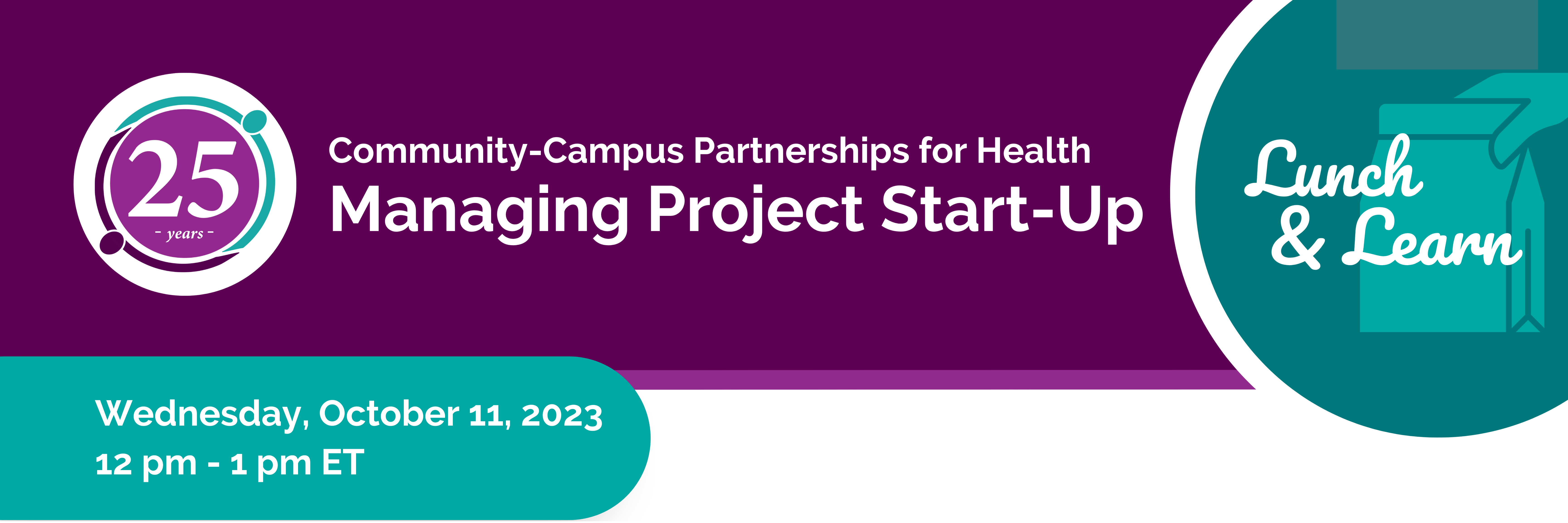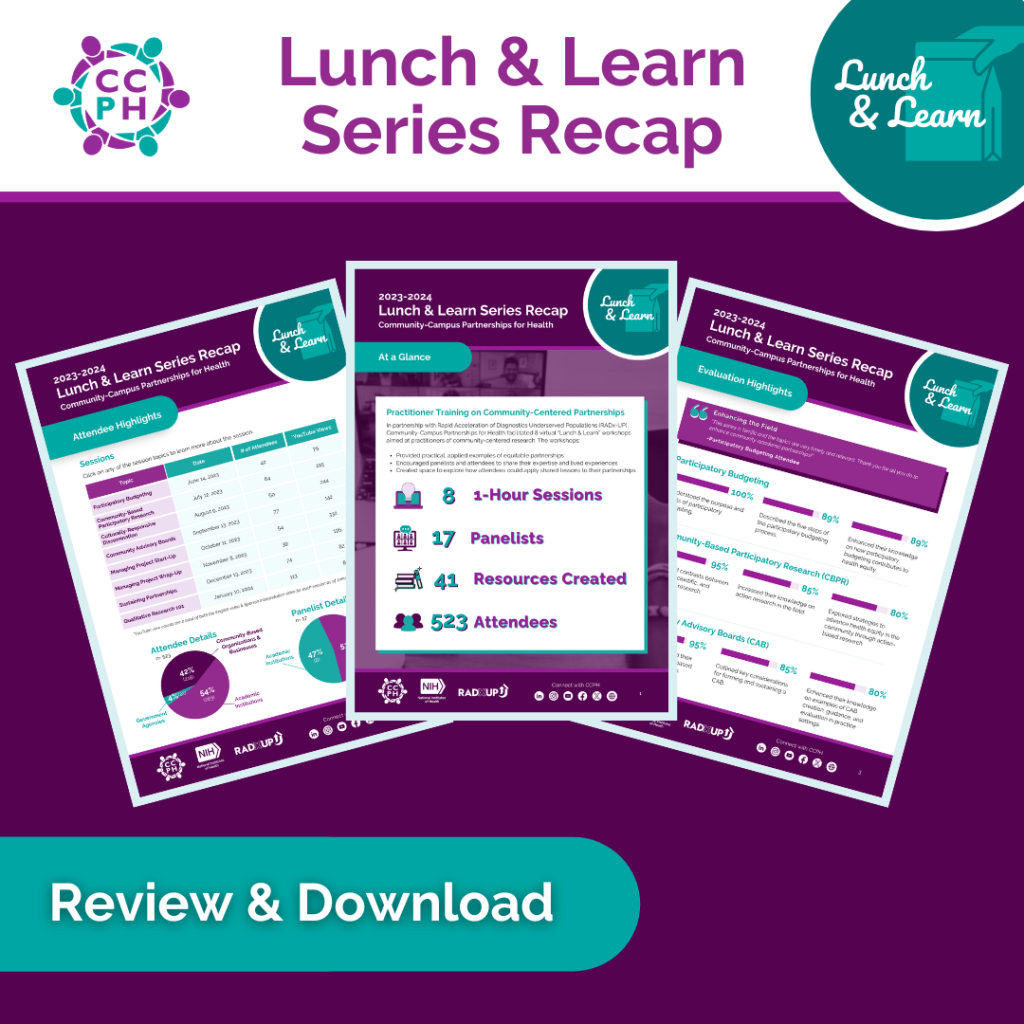
Managing Project Start-Up was an action-oriented workshop that included a panel discussion addressing fiscal equity, transparency, and clear lines of communication. We shared concrete strategies to address the equity-based challenges of starting a community-academic research project.
By participating in this workshop, we hope that attendees are able to review the CCPH Principles of Partnership; list the components of partnership agreements; and describe strategies to facilitate, organize, and maintain healthy, authentic partnerships.
Attendees received a key takeaways one-pager with panelist quotes, a slide deck with additional resources, and Engage for Equity’s Promising Practices Guide for Community-Based Participatory Research.
Attendees are encouraged to adopt and apply the ideas and practices discussed during the workshop to create meaningful community connections and start research projects through an equity lens.
This virtual workshop will have Spanish language and ASL interpretation, and recordings will be made publicly available in both English and Spanish language.
Watch the recording in English:
Watch the recording in Spanish:
Panelists

Lori Brand Bateman, Ph.D., RD, Assistant Professor in the Division of Preventive Medicine at the University of Alabama at Birmingham (UAB), is a medical sociologist with training and experience in community-based participatory research (CBPR), health promotion, and bioethics. Her research primarily examines health and illness in the context of social structure. She focuses on racial/ethnic health disparities, how social determinants shape health and well-being, and community-engaged interventions to ameliorate health disparities and improve health outcomes. She approaches her work through the lens of CBPR, collaborating with local, regional, national, and international partners.
Current projects focus on developing, implementing, and evaluating community-engaged interventions that impact violence prevention in low-resource communities, obesity in African-American women, and cancer prevention and early detection in low-resource settings. Dr. Bateman also examines racial/ethnic disparities related to COVID-19 testing and vaccination as a co-investigator for Alabama CEAL (PI: Fouad), lead investigator for the RADx-UP project COVID-19 Testing Model for Vulnerable Populations: Revision to Address Vaccine Hesitancy and Uptake, and co-investigator on Reducing Ethical and Social Prejudicial Effects of COVID-19 Testing in Underserved Populations (RESPECT-UP) (PI: Oates). All these projects engage community stakeholders in the development and implementation of interventions.

Tiffany Osborne, Director of Community Engagement for the University of Alabama at Birmingham (UAB) Minority Health & Health Equity Research Center (MHERC), has more than 25 years of experience building and maintaining strong academic-community relationships. She leads a community engagement team that supports investigators to positively impact health in vulnerable populations experiencing health disparities. Tiffany’s ability to communicate effectively with individuals from diverse racial, ethnic, socioeconomic, and gender backgrounds was honed by her experiences as a television news journalist. She implements bi-directional communication strategies to engage researchers and communities in identifying and prioritizing health issues while achieving research goals. In addition, she integrates community-engagement approaches and cultural knowledge into leadership, research, and communication throughout the MHERC. Her passion for connecting with communities through the lens of community-based participatory research is evidenced by the development and maintenance of more than ten academic-community coalitions and advisory boards, with membership surpassing 250 individuals and organizations.
Current research projects that Tiffany supports focus on developing, implementing, and evaluating interventions that impact violence prevention in low-resourced communities, obesity, cancer, and other chronic conditions in minority individuals, and genomic health. Tiffany also leads COVID-19 vaccine awareness and education efforts as part of several RADx-UP projects and Alabama CEAL.

Gabriela Oates, PhD, Associate Professor in the University of Alabama at Birmingham (UAB) Heersink School of Medicine, is a social epidemiologist with training in sociological theory and research methods focused on the social determinants of health (SDH), and experience in the application of SDH measures, tools, and data for health disparities research. Dr. Oates is the Lead PI of the NIMHD-funded RADx-UP community-engaged project, Reducing Ethical and Social Prejudicial Effects of COVID-19 Testing in Underserved Populations (RESPECT-UP); multiple PI of a community-engaged research project in the NCI-funded Center for Cancer Control in Persistent Poverty Areas; and Co-Lead for Health Equity in the HRSA-funded Regional Pediatric Pandemic Network (PPN). She chaired the RADx-UP Social Determinants of Health Working Group and leads the Social Determinants of Health Core of the UAB Minority Health and Health Equity Research Center. Her work is funded by grants from the National Institutes of Health, the Health Resources and Services Administration, the Alabama Department of Public Health, and the Cystic Fibrosis Foundation, among others.
Facilitator


